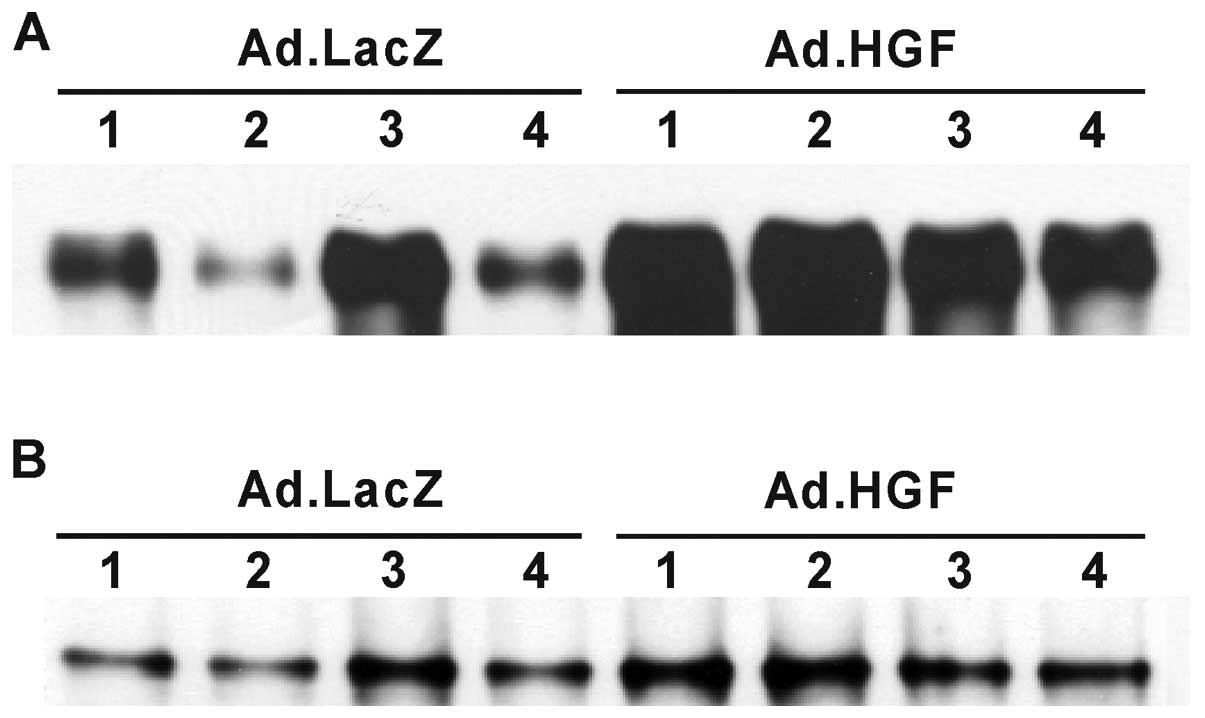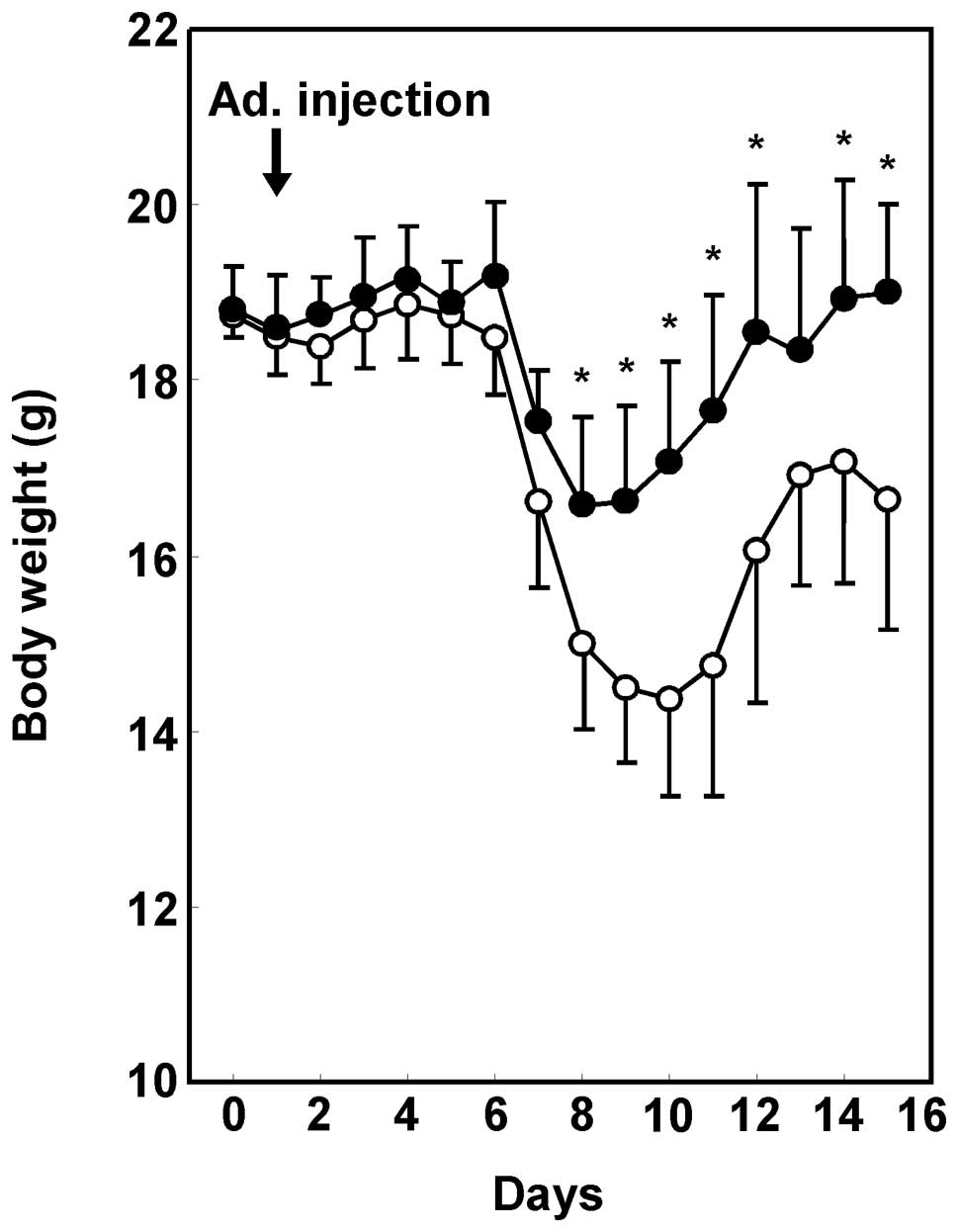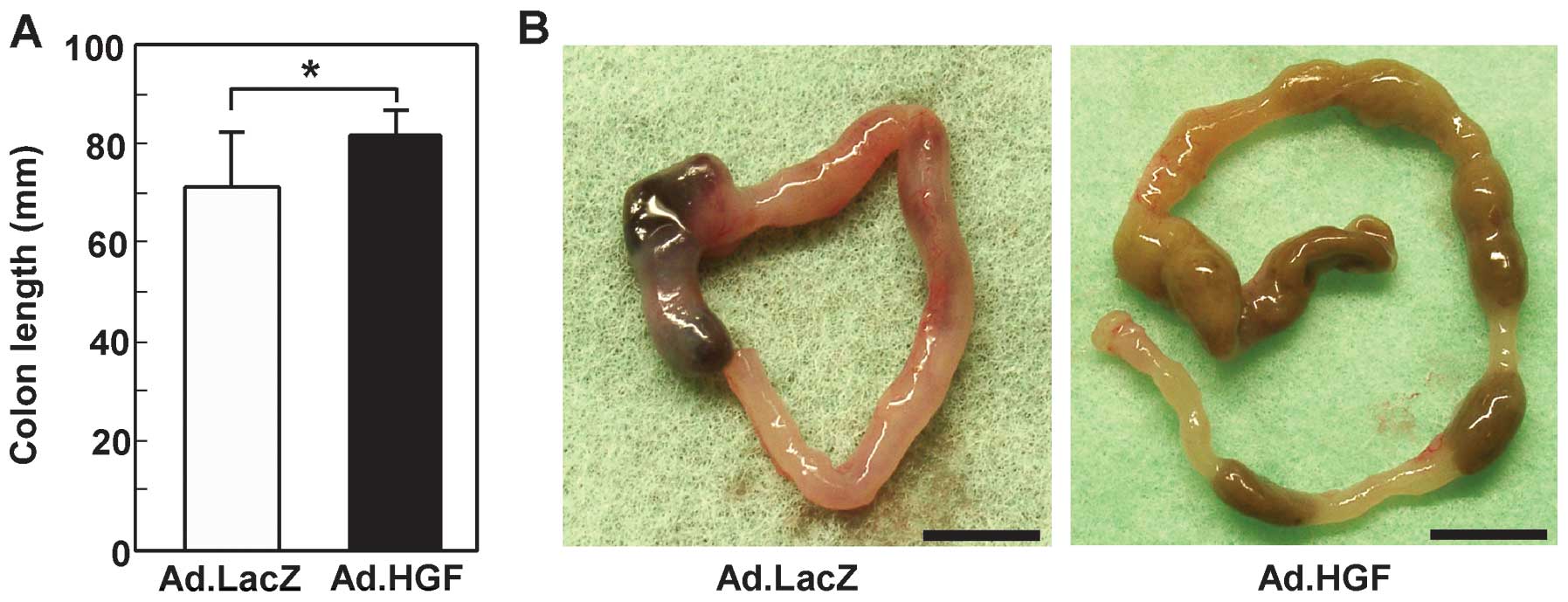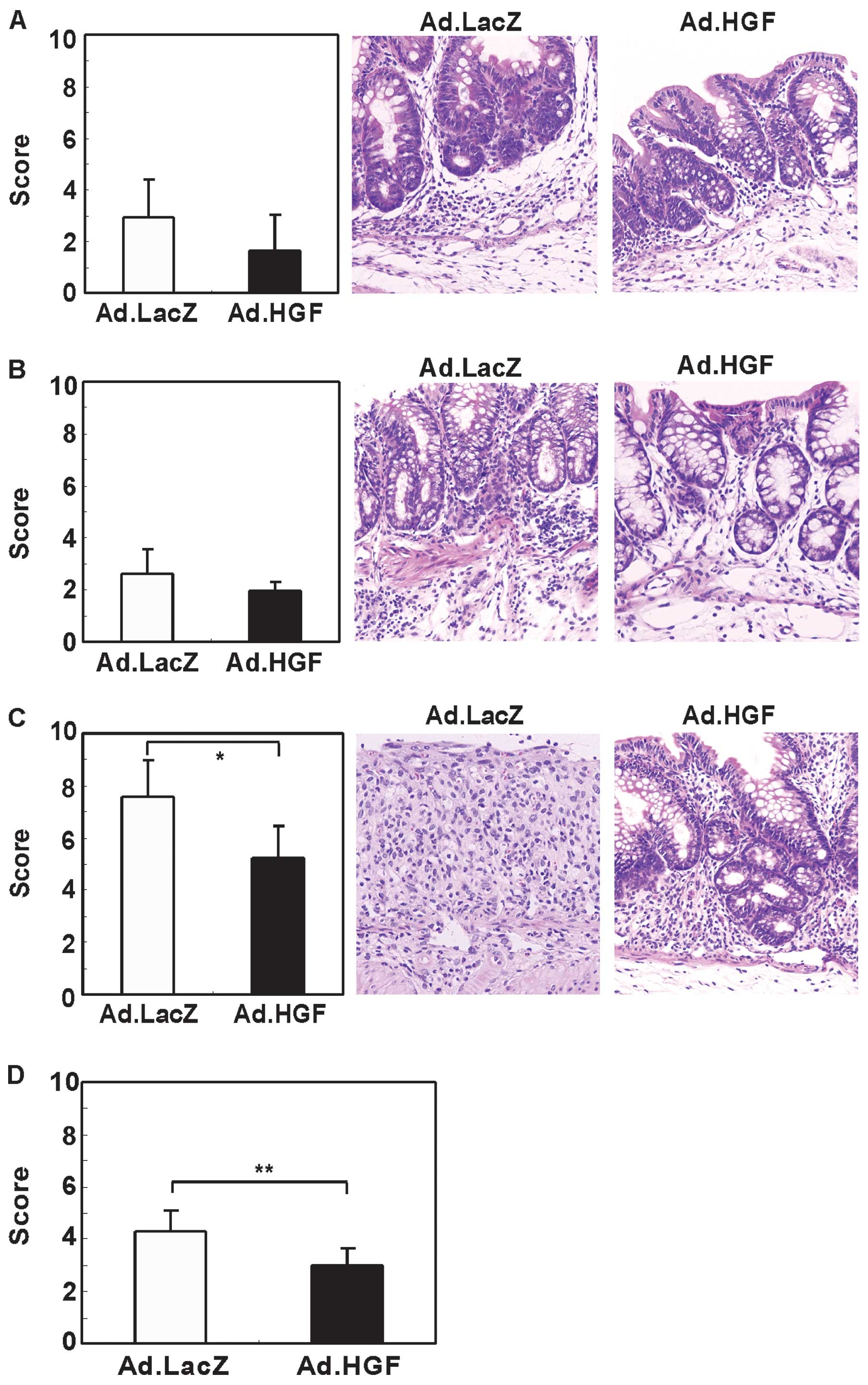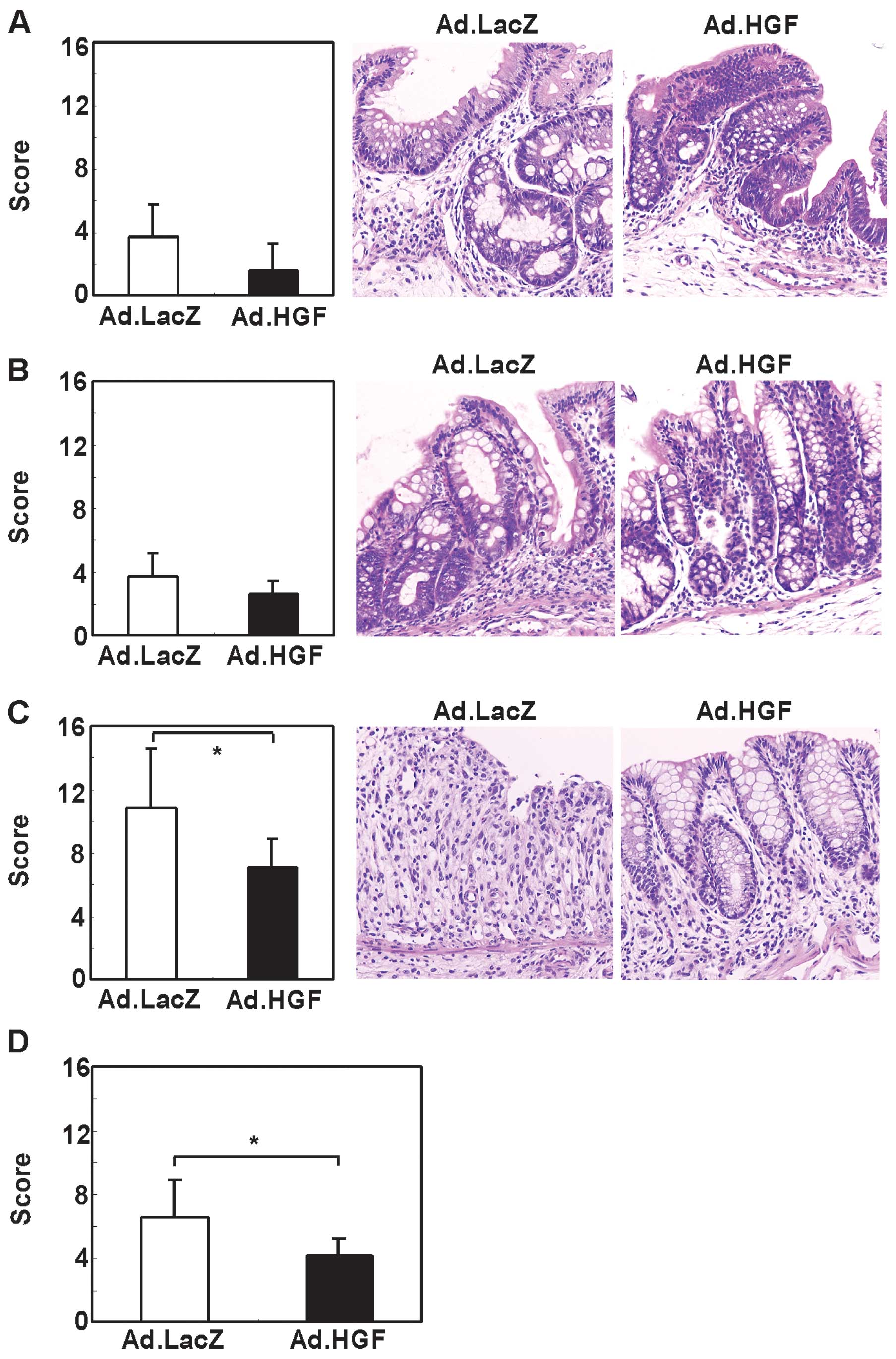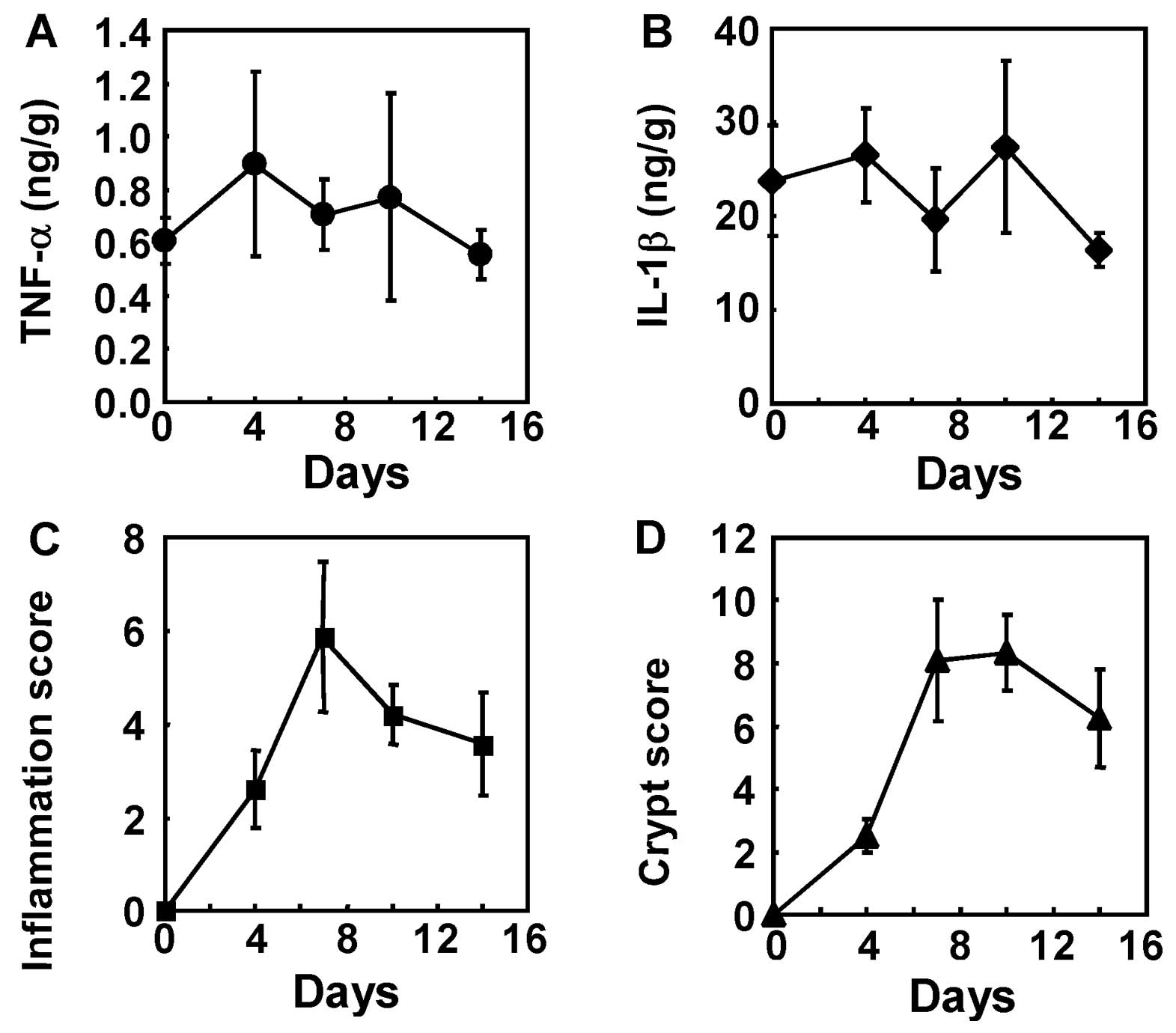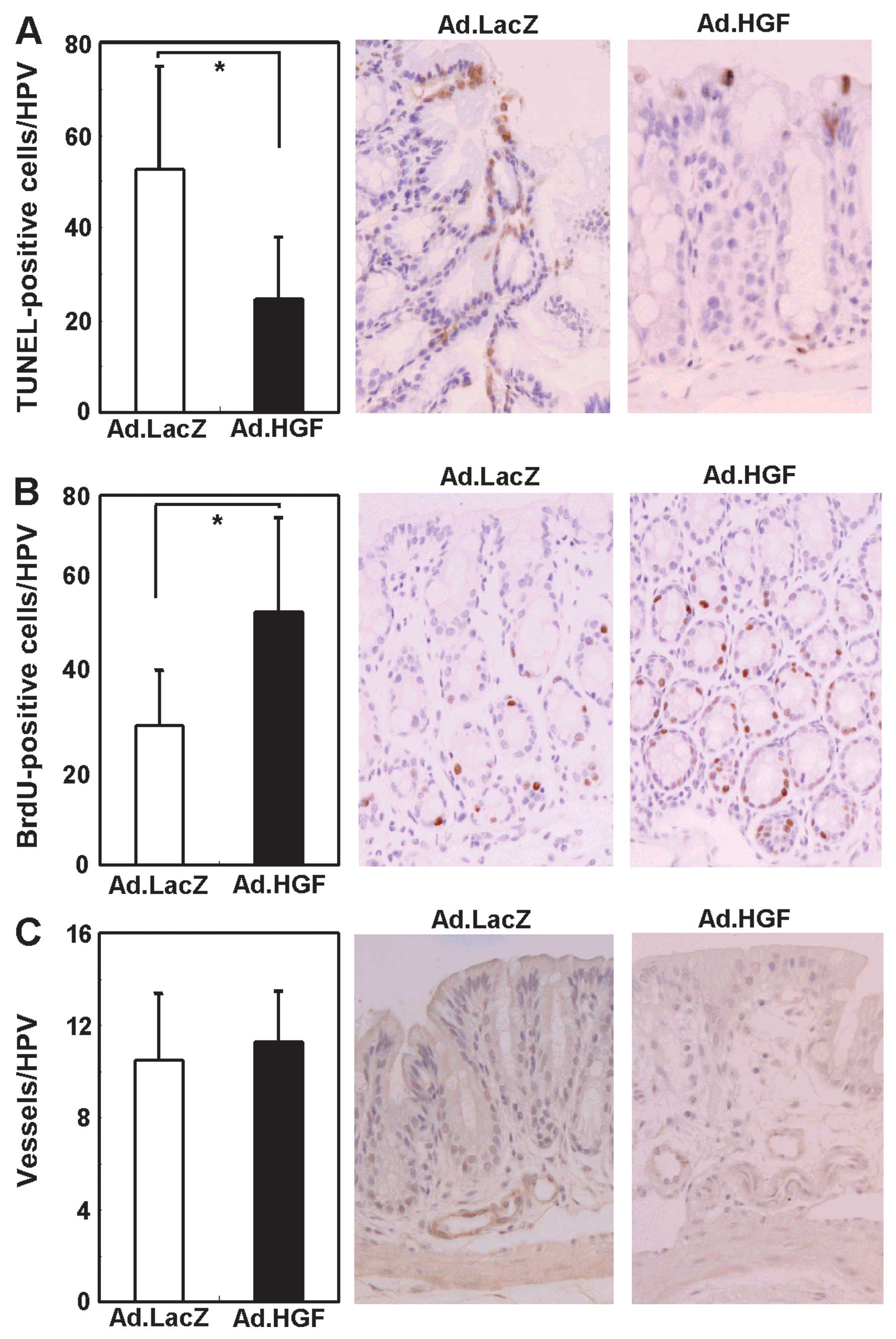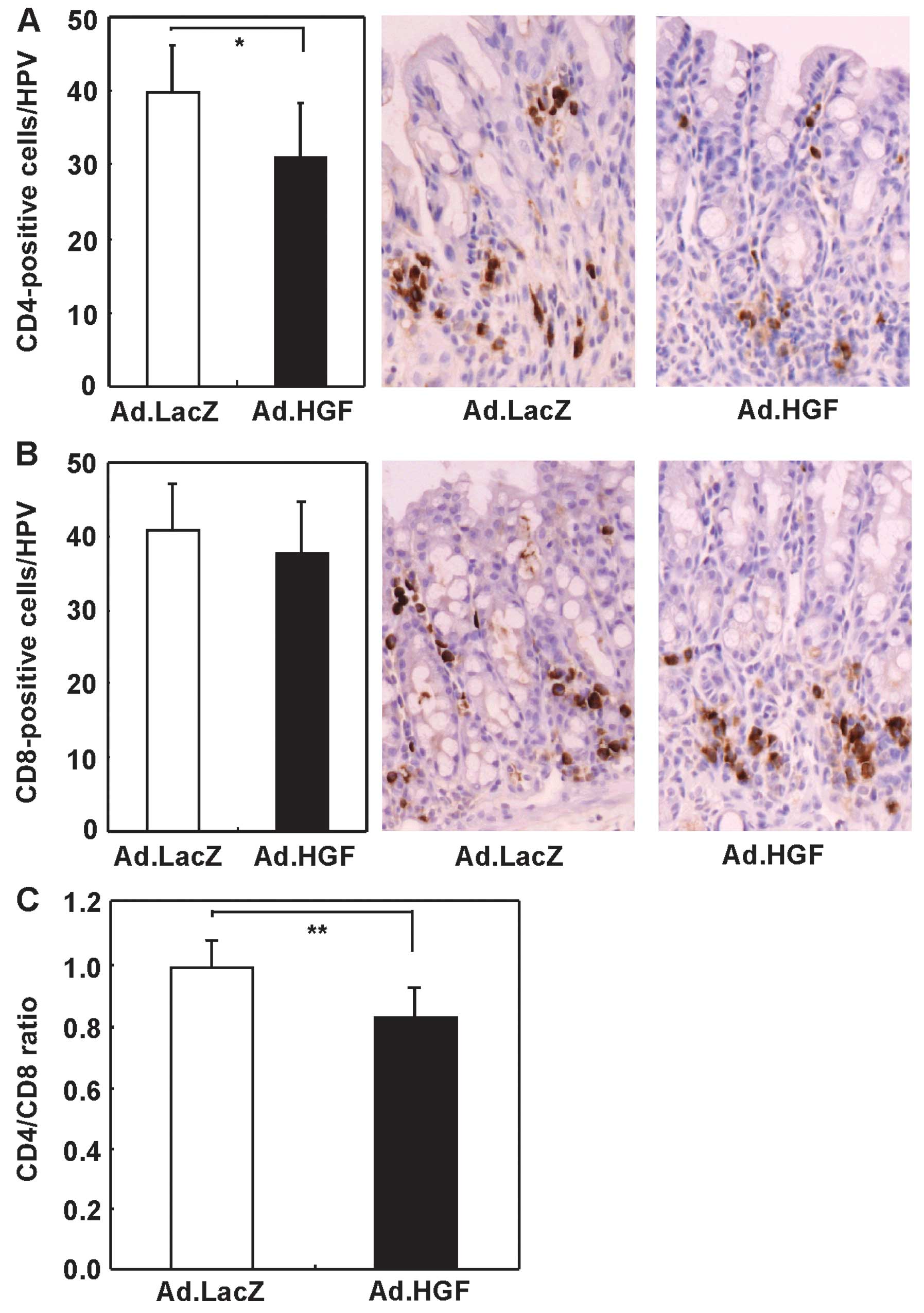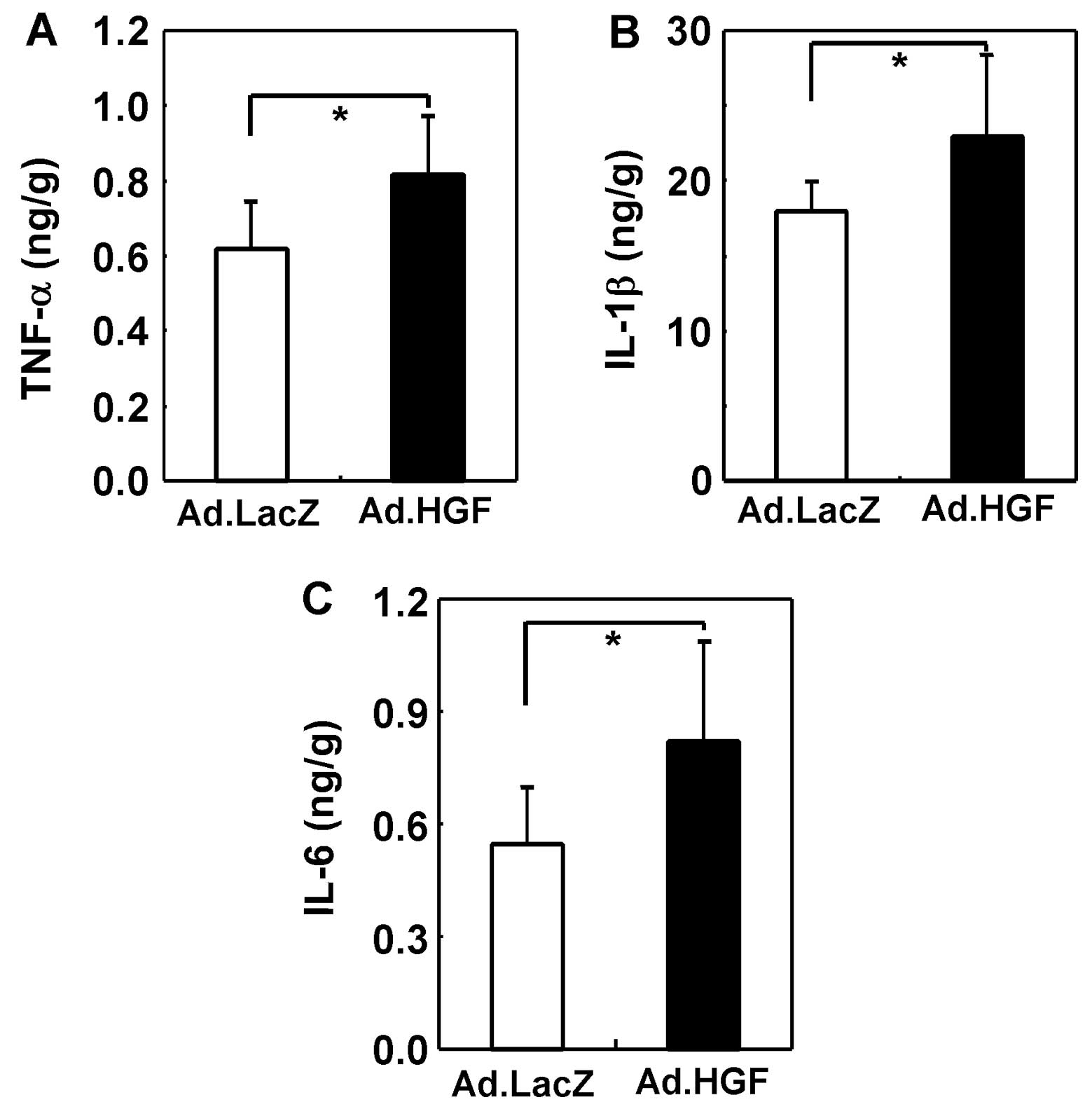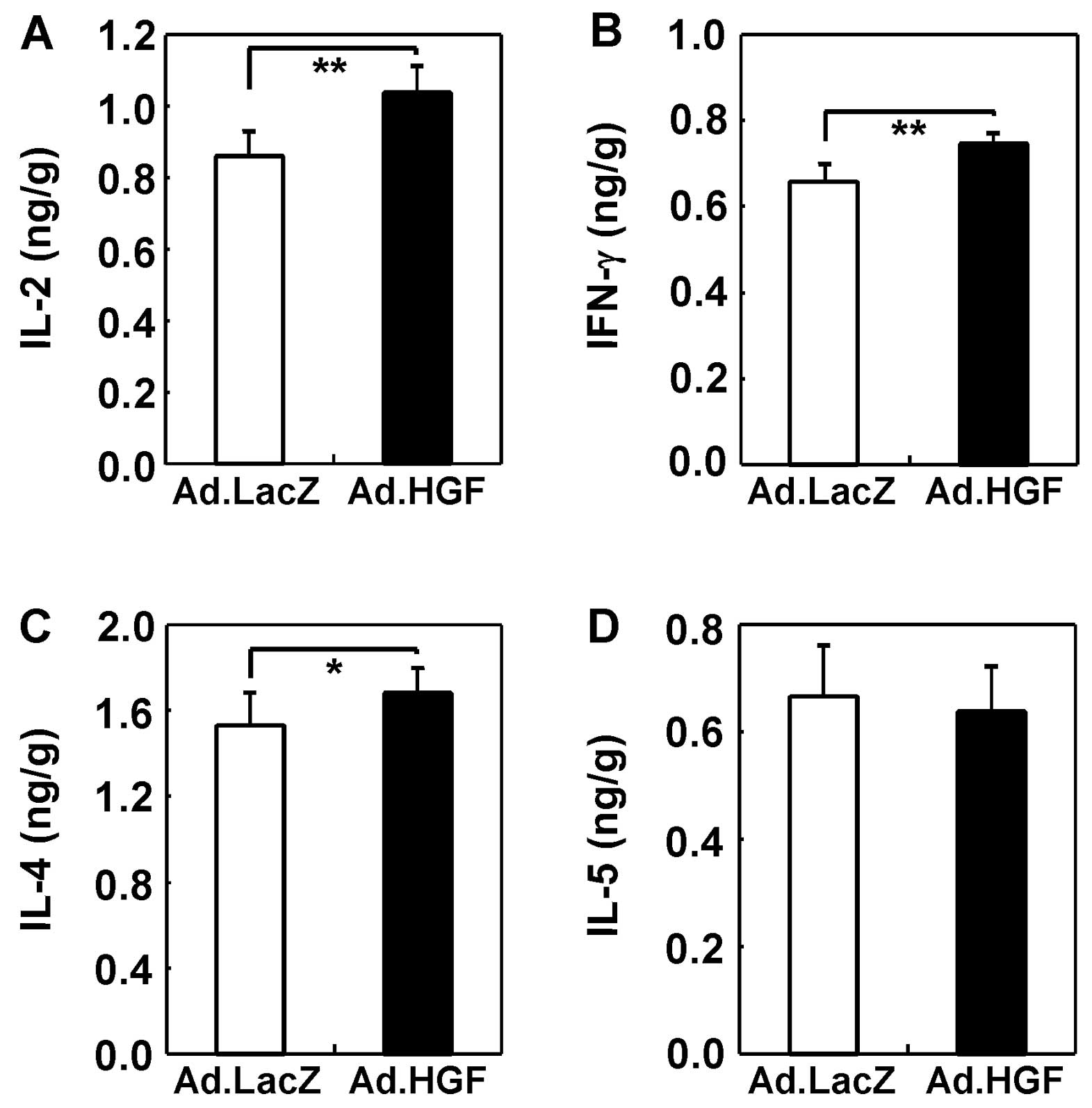|
1
|
Hisamatsu T, Kanai T, Mikami Y, Yoneno K,
Matsuoka K and Hibi T: Immune aspects of the pathogenesis of
inflammatory bowel disease. Pharmacol Ther. 137:283–297. 2013.
View Article : Google Scholar : PubMed/NCBI
|
|
2
|
Bernklev T, Jahnsen J, Aadland E, et al:
Health-related quality of life in patients with inflammatory bowel
disease five years after the initial diagnosis. Scand J
Gastroenterol. 39:365–373. 2004.PubMed/NCBI
|
|
3
|
Burger D and Travis S: Conventional
medical management of inflammatory bowel disease. Gastroenterology.
140:1827–1837. e18222011. View Article : Google Scholar : PubMed/NCBI
|
|
4
|
Nakamura T, Nawa K and Ichihara A: Partial
purification and characterization of hepatocyte growth factor from
serum of hepatectomized rats. Biochem Biophys Res Commun.
122:1450–1459. 1984. View Article : Google Scholar : PubMed/NCBI
|
|
5
|
Russell WE, McGowan JA and Bucher NL:
Partial characterization of a hepatocyte growth factor from rat
platelets. J Cell Physiol. 119:183–192. 1984. View Article : Google Scholar : PubMed/NCBI
|
|
6
|
Thaler FJ and Michalopoulos GK:
Hepatopoietin A: partial characterization and trypsin activation of
a hepatocyte growth factor. Cancer Res. 45:2545–2549.
1985.PubMed/NCBI
|
|
7
|
Gohda E, Tsubouchi H, Nakayama H, et al:
Human hepatocyte growth factor in plasma from patients with
fulminant hepatic failure. Exp Cell Res. 166:139–150. 1986.
View Article : Google Scholar : PubMed/NCBI
|
|
8
|
Nakamura T, Nishizawa T, Hagiya M, et al:
Molecular cloning and expression of human hepatocyte growth factor.
Nature. 342:440–443. 1989. View
Article : Google Scholar : PubMed/NCBI
|
|
9
|
Miyazawa K, Tsubouchi H, Naka D, et al:
Molecular cloning and sequence analysis of cDNA for human
hepatocyte growth factor. Biochem Biophys Res Commun. 163:967–973.
1989. View Article : Google Scholar : PubMed/NCBI
|
|
10
|
Matsumoto K and Nakamura T: Hepatocyte
growth factor (HGF) as a tissue organizer for organogenesis and
regeneration. Biochem Biophys Res Commun. 239:639–644. 1997.
View Article : Google Scholar : PubMed/NCBI
|
|
11
|
Matsuno M, Shiota G, Umeki K, Kawasaki H,
Kojo H and Miura K: Clinical evaluation of hepatocyte growth factor
in patients with gastrointestinal and pancreatic diseases with
special reference to inflammatory bowel disease. Res Commun Mol
Pathol Pharmacol. 97:25–37. 1997.PubMed/NCBI
|
|
12
|
Kitamura S, Kondo S, Shinomura Y, et al:
Expression of hepatocyte growth factor and c-met in ulcerative
colitis. Inflamm Res. 49:320–324. 2000. View Article : Google Scholar : PubMed/NCBI
|
|
13
|
Srivastava M, Zurakowski D, Cheifetz P,
Leichtner A and Bousvaros A: Elevated serum hepatocyte growth
factor in children and young adults with inflammatory bowel
disease. J Pediatr Gastroenterol Nutr. 33:548–553. 2001. View Article : Google Scholar : PubMed/NCBI
|
|
14
|
Ortega-Cava CF, Ishihara S, Kawashima K,
et al: Hepatocyte growth factor expression in dextran sodium
sulfate-induced colitis in rats. Dig Dis Sci. 47:2275–2285. 2002.
View Article : Google Scholar : PubMed/NCBI
|
|
15
|
Dignass AU, Lynch-Devaney K and Podolsky
DK: Hepatocyte growth factor/scatter factor modulates intestinal
epithelial cell proliferation and migration. Biochem Biophys Res
Commun. 202:701–709. 1994. View Article : Google Scholar : PubMed/NCBI
|
|
16
|
Numata M, Ido A, Moriuchi A, et al:
Hepatocyte growth factor facilitates the repair of large colonic
ulcers in 2,4,6-trinitrobenzene sulfonic acid-induced colitis in
rats. Inflamm Bowel Dis. 11:551–558. 2005. View Article : Google Scholar : PubMed/NCBI
|
|
17
|
Tahara Y, Ido A, Yamamoto S, et al:
Hepatocyte growth factor facilitates colonic mucosal repair in
experimental ulcerative colitis in rats. J Pharmacol Exp Ther.
307:146–151. 2003. View Article : Google Scholar : PubMed/NCBI
|
|
18
|
Ohda Y, Hori K, Tomita T, et al: Effects
of hepatocyte growth factor on rat inflammatory bowel disease
models. Dig Dis Sci. 50:914–921. 2005. View Article : Google Scholar : PubMed/NCBI
|
|
19
|
Setoyama H, Ido A, Numata M, et al:
Repeated enemas with hepatocyte growth factor selectively stimulate
epithelial cell proliferation of injured mucosa in rats with
experimental colitis. Life Sci. 89:269–275. 2011. View Article : Google Scholar : PubMed/NCBI
|
|
20
|
Arthur LG, Schwartz MZ, Kuenzler KA and
Birbe R: Hepatocyte growth factor treatment ameliorates diarrhea
and bowel inflammation in a rat model of inflammatory bowel
disease. J Pediatr Surg. 39:139–143. 2004. View Article : Google Scholar
|
|
21
|
Mukoyama T, Kanbe T, Murai R, et al:
Therapeutic effect of adenoviral-mediated hepatocyte growth factor
gene administration on TNBS-induced colitis in mice. Biochem
Biophys Res Commun. 329:1217–1224. 2005. View Article : Google Scholar : PubMed/NCBI
|
|
22
|
Hanawa T, Suzuki K, Kawauchi Y, et al:
Attenuation of mouse acute colitis by naked hepatocyte growth
factor gene transfer into the liver. J Gene Med. 8:623–635. 2006.
View Article : Google Scholar : PubMed/NCBI
|
|
23
|
Kanbe T, Murai R, Mukoyama T, et al: Naked
gene therapy of hepatocyte growth factor for dextran sulfate
sodium-induced colitis in mice. Biochem Biophys Res Commun.
345:1517–1525. 2006. View Article : Google Scholar : PubMed/NCBI
|
|
24
|
Kanayama M, Takahara T, Yata Y, et al:
Hepatocyte growth factor promotes colonic epithelial regeneration
via Akt signaling. Am J Physiol Gastrointest Liver Physiol.
293:G230–G239. 2007. View Article : Google Scholar : PubMed/NCBI
|
|
25
|
Li Y, Takemura G, Kosai K, et al:
Postinfarction treatment with an adenoviral vector expressing
hepatocyte growth factor relieves chronic left ventricular
remodeling and dysfunction in mice. Circulation. 107:2499–2506.
2003. View Article : Google Scholar
|
|
26
|
Chen SH, Chen XH, Wang Y, et al:
Combination gene therapy for liver metastasis of colon carcinoma in
vivo. Proc Natl Acad Sci USA. 92:2577–2581. 1995. View Article : Google Scholar : PubMed/NCBI
|
|
27
|
Takahashi T, Kawai T, Ushikoshi H, et al:
Identification and isolation of embryonic stem cell-derived target
cells by adenoviral conditional targeting. Mol Ther. 14:673–683.
2006. View Article : Google Scholar : PubMed/NCBI
|
|
28
|
Okabe Y, Kusaga A, Takahashi T, et al:
Neural development of methyl-CpG-binding protein 2 null embryonic
stem cells: a system for studying Rett syndrome. Brain Res.
1360:17–27. 2010. View Article : Google Scholar : PubMed/NCBI
|
|
29
|
Horikawa Y, Wang Y, Nagano S, et al:
Assessment of an altered E1B promoter on the specificity and
potency of triple-regulated conditionally replicating adenoviruses:
implications for the generation of ideal m-CRAs. Cancer Gene Ther.
18:724–733. 2011. View Article : Google Scholar : PubMed/NCBI
|
|
30
|
Okayasu I, Hatakeyama S, Yamada M, Ohkusa
T, Inagaki Y and Nakaya R: A novel method in the induction of
reliable experimental acute and chronic ulcerative colitis in mice.
Gastroenterology. 98:694–702. 1990.PubMed/NCBI
|
|
31
|
Tomoyose M, Mitsuyama K, Ishida H,
Toyonaga A and Tanikawa K: Role of interleukin-10 in a murine model
of dextran sulfate sodium-induced colitis. Scand J Gastroenterol.
33:435–440. 1998. View Article : Google Scholar : PubMed/NCBI
|
|
32
|
Kanauchi O, Nakamura T, Agata K, Mitsuyama
K and Iwanaga T: Effects of germinated barley foodstuff on dextran
sulfate sodium-induced colitis in rats. J Gastroenterol.
33:179–188. 1998. View Article : Google Scholar : PubMed/NCBI
|
|
33
|
Yuge K, Takahashi T, Nagano S, et al:
Adenoviral gene transduction of hepatocyte growth factor elicits
inhibitory effects for hepatoma. Int J Oncol. 27:77–85.
2005.PubMed/NCBI
|
|
34
|
Kamisasanuki T, Tokushige S, Terasaki H,
et al: Targeting CD9 produces stimulus-independent antiangiogenic
effects predominantly in activated endothelial cells during
angiogenesis: a novel antiangiogenic therapy. Biochem Biophys Res
Commun. 413:128–135. 2011. View Article : Google Scholar
|
|
35
|
Murthy SN, Cooper HS, Shim H, Shah RS,
Ibrahim SA and Sedergran DJ: Treatment of dextran sulfate
sodium-induced murine colitis by intracolonic cyclosporin. Dig Dis
Sci. 38:1722–1734. 1993. View Article : Google Scholar : PubMed/NCBI
|
|
36
|
Li Y, Takemura G, Kosai K, et al: Critical
roles for the Fas/Fas ligand system in postinfarction ventricular
remodeling and heart failure. Circ Res. 95:627–636. 2004.
View Article : Google Scholar : PubMed/NCBI
|
|
37
|
Iwamoto M, Koji T, Makiyama K, Kobayashi N
and Nakane PK: Apoptosis of crypt epithelial cells in ulcerative
colitis. J Pathol. 180:152–159. 1996. View Article : Google Scholar : PubMed/NCBI
|
|
38
|
Sträter J, Wellisch I, Riedl S, et al:
CD95 (APO-1/Fas)-mediated apoptosis in colon epithelial cells: a
possible role in ulcerative colitis. Gastroenterology. 113:160–167.
1997.PubMed/NCBI
|
|
39
|
Rogler G and Andus T: Cytokines in
inflammatory bowel disease. World J Surg. 22:382–389. 1998.
View Article : Google Scholar : PubMed/NCBI
|
|
40
|
Egger B, Bajaj-Elliott M, MacDonald TT,
Inglin R, Eysselein VE and Büchler MW: Characterisation of acute
murine dextran sodium sulphate colitis: cytokine profile and dose
dependency. Digestion. 62:240–248. 2000. View Article : Google Scholar : PubMed/NCBI
|
|
41
|
Tomanin R and Scarpa M: Why do we need new
gene therapy viral vectors? Characteristics, limitations and future
perspectives of viral vector transduction. Curr Gene Ther.
4:357–372. 2004. View Article : Google Scholar : PubMed/NCBI
|
|
42
|
Boulaiz H, Marchal JA, Prados J, Melguizo
C and Aránega A: Non-viral and viral vectors for gene therapy. Cell
Mol Biol (Noisy-le-grand). 51:3–22. 2005.
|
|
43
|
Oh K, Iimuro Y, Takeuchi M, et al:
Ameliorating effect of hepatocyte growth factor on inflammatory
bowel disease in a murine model. Am J Physiol Gastrointest Liver
Physiol. 288:G729–G735. 2005. View Article : Google Scholar : PubMed/NCBI
|
|
44
|
Shiota G, Kawasaki H, Nakamura T and
Schmidt EV: Characterization of double transgenic mice expressing
hepatocye growth factor and transforming growth factor alpha. Res
Commun Mol Pathol Pharmacol. 90:17–24. 1995.PubMed/NCBI
|
|
45
|
Sakata H, Takayama H, Sharp R, Rubin JS,
Merlino G and LaRochelle WJ: Hepatocyte growth factor/scatter
factor overexpression induces growth, abnormal development, and
tumor formation in transgenic mouse livers. Cell Growth Differ.
7:1513–1523. 1996.
|
|
46
|
Chen P, Kovesdi I and Bruder JT: Effective
repeat administration with adenovirus vectors to the muscle. Gene
Ther. 7:587–595. 2000. View Article : Google Scholar : PubMed/NCBI
|
|
47
|
Jeschke MG, Bolder U, Finnerty CC, et al:
The effect of hepatocyte growth factor on gut mucosal apoptosis and
proliferation, and cellular mediators after severe trauma. Surgery.
138:482–489. 2005. View Article : Google Scholar : PubMed/NCBI
|
|
48
|
Futamatsu H, Suzuki J, Mizuno S, et al:
Hepatocyte growth factor ameliorates the progression of
experimental autoimmune myocarditis: a potential role for induction
of T helper 2 cytokines. Circ Res. 96:823–830. 2005. View Article : Google Scholar : PubMed/NCBI
|
|
49
|
Kuroiwa T, Iwasaki T, Imado T, Sekiguchi
M, Fujimoto J and Sano H: Hepatocyte growth factor prevents lupus
nephritis in a murine lupus model of chronic graft-versus-host
disease. Arthritis Res Ther. 8:R1232006. View Article : Google Scholar : PubMed/NCBI
|
|
50
|
Okunishi K, Dohi M, Nakagome K, et al: A
novel role of hepatocyte growth factor as an immune regulator
through suppressing dendritic cell function. J Immunol.
175:4745–4753. 2005. View Article : Google Scholar : PubMed/NCBI
|
|
51
|
Ito W, Takeda M, Tanabe M, et al:
Anti-allergic inflammatory effects of hepatocyte growth factor. Int
Arch Allergy Immunol. 146(Suppl 1): S82–S87. 2008. View Article : Google Scholar
|
|
52
|
Okunishi K, Dohi M, Fujio K, et al:
Hepatocyte growth factor significantly suppresses collagen-induced
arthritis in mice. J Immunol. 179:5504–5513. 2007. View Article : Google Scholar : PubMed/NCBI
|















